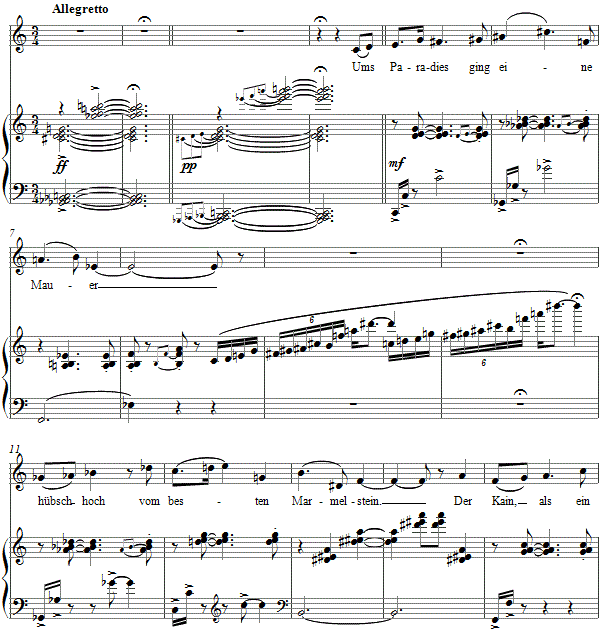Music and Texts of GARY BACHLUND
Vocal Music | Piano | Organ | Chamber Music | Orchestral | Articles and Commentary | Poems and Stories | Miscellany | FAQs
So nicht - (2012)
Wilhelm Busch
for medium voice and piano
Ums Paradies ging eine Mauer
Hübsch hoch vom besten Marmelstein.
Der Kain, als ein Bub, ein schlauer,
Denkt sich: Ich komme doch hinein.
Er stieg hinauf zu diesem Zwecke
An einer Leiter mäuschenstumm.
Da schlich der Teufel um die Ecke
Und stieß ihn samt der Leiter um.
Der Vater Adam, ders gesehen,
Sprach, während er ihn liegen ließ:
Du Schlingel! Dir ist recht geschehen.
So kommt man nicht ins Paradies.4 pages, circa 2' 30"
Wilhelm Busch
Eden round, there went a great wall,
Highly high and of marble fine.
Killer Cain thought with shrewdest gall:
I'll enter in by way clandestine.
To this, his end, up then he stepped
On a brought-along ladder, like a clever rat.
Then roundabout the old Devil crept,
Upending Cain's ladder! O-o-o! Splat!
Our old Father Adam saw it all,
And said to Cain where he sprawled:
You rogue! You deserved your second fall;
Into paradise are all not always called.
rhymed paraphrase by the composer
Copyright 2012 © Gary Bachlund All international rights reserved.
The setting is built on a rather tonal twelve tone row, for the amusement of it and stemming from a conversation I had with a singer who mentioned that some of her colleagues found my music not modern "like the twelve tone system." Of course that system is now a century or so old, the aggregations of techniques laid over it are many over fifty years old. As another had remarked, such "modernity" is no longer subversive but hardened into its own orthodoxy. With that statement I fully agree, for what is "modern" is not a now historical texture, color or handling method become so -- well -- historical.
The voice part's twelve tones break apart into three four-note units, two major chords with the added second, and a final cadence which could serve as a substitute dominant fulcrum back. The style for the accompaniment should be rather melodramatic, partly music hall licks and partly silent movie music gestures blurred with the sostenuto pedal. The notion of composing with twelve tones remains amusing to me as an orthodoxy, for so many other rows of lesser members can be fashioned.
My setting of Busch's Die Selbstkritik hat viel für sich is one such a setting, based on the four-note row after John Cage's name.
The score for So nicht is available as a free PDF download, though any major commercial performance or recording of the work is prohibited without prior arrangement with the composer. Click on the graphic below for this piano-vocal score.

